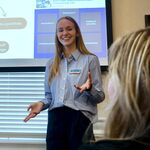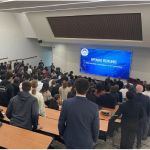

Reading complete novels, conducting original research, and writing a 12-page paper—all in another language—seemed a daunting enough task for one semester to Meghan O’Donnell ’18. Fast forward to the end of the semester, and she found that she not only thrived in the class, but was asked to present her research in that language to a conference of scholars and professionals alike.
“I was almost dumbfounded that we were expected to read full novels in French at the beginning of the semester,” O’Donnell recalled. “I was shocked by how quickly we moved, too, but also by how quickly I found myself acclimating to the language.”
A French and history double major, O’Donnell signed up for the French literature course with Prof. Florence Jurney in order to learn more French culture and history than she had been able to in any of her high school courses.
“It was a survey course, in a way, of the literature of Québec,” O’Donnell explained. “Each book that we read advanced through time chronologically, discussing different ideas of what it meant to be French Canadian, specifically Québécois. I felt we were really discussing what it meant to be a culture and what it means to have a history— as well as the different ways people connect to their perceived historical and cultural identities.”

Having a dual passion for both the French language and history, she said the first assignment that really connected her two interests was Pélagie-la-Charrette by Antonine Maillet, a novel set in 1770 focused on the migration of the Acadian people from the American South back to Canada. She was fascinated with the novel as it explored the significance of culture, history, and identity to a group of people who were displaced from their homeland.
When it came time to determine her research topic, exploring the intricacies of Pélagie-la-Charrette seemed the only natural fit.
“With this book, it felt like it was the first time I could combine the theories I had learned in history with French culture, and that was fascinating to me,” O’Donnell said. “I never thought the two fields of study could come together so well or in such a complex way.”
Another thing she never thought of—being invited to present her research at the Women in French 2016 conference, an international organization of 400 to 500 members of the scholarly community, which was held on campus.
O'Donnell's innate interest in the field stood out to Jurney, who was organizing the conference, and with her encouragement, O’Donnell found herself preparing for the presentation. The only hitch—in O’Donnell’s mind—was that the presentation would be completely in French.
Having already surpassed her own ideas of what she was capable of doing in the French language, though, O’Donnell anxiously accepted the challenge.
“I never could have imagined that just this past semester I could create work that was worthy of being presented, but Professor Jurney told me how this research fit into the conference. She also made sure that I knew she wasn’t asking me just because I was her student, but because she thought my work was good enough to be shared,” O’Donnell stated. “It was really validating, to think that I had written something in a language that was not my native language that showed ability.”
With guidance from Jurney, O’Donnell began to prepare for the presentation. She worked on everything from what she would say to how exactly she would say it.
“I’m a fairly confident presenter in English, but the fact that I was presenting my research in French was terrifying in a good way,” O’Donnell said. “I just really wanted to make sure I didn’t stumble over the language at all.”
On the morning of the conference, which welcomed 90 scholars from all over the United States as well as Canada, France, and the United Kingdom, O’Donnell gave a quick introduction in English to ease her nerves and then was off to her presentation. While she felt as though time stopped, it was over almost as quickly as it had started, and the result was pleasantly surprising.
“Many of the conference attendees stopped to congratulate me after I had given my presentation,” O’Donnell stated. “It wasn’t because my research was particularly mind-blowing or new. All of these people whom I had never met before were simply proud of me for presenting at my first conference; the environment was incredibly welcoming and supportive.”

With the conference and a challenging course behind her, O’Donnell is now looking forward to her next academic adventures.
“I’ll be working with Center for Public Service as the program coordinator for Surge and will be joining the Civil War Institute as one of their CWI Fellows. I will also be studying abroad in France during my spring semester,” O’Donnell said. “It’s hard to imagine where things will lead during the rest of my time at Gettysburg, but my hope is to continue doing research that inspires and engages me. This conference was such a high point, and I just want to keep that momentum going.”


